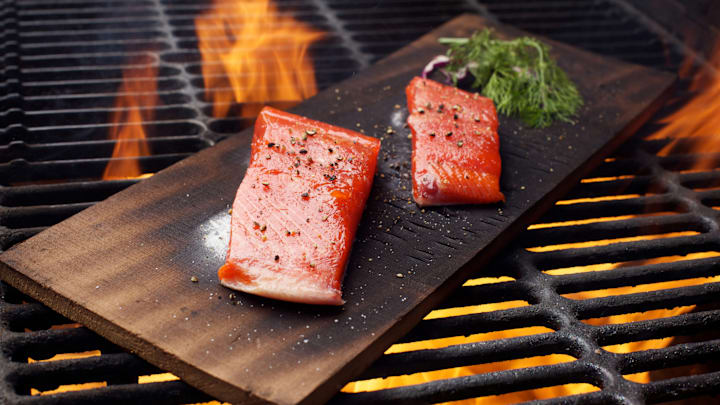There’s no shortage of fancy gadgets designed to take your grilling game to the next level. If you’re already accustomed to digital meat thermometers and marinade syringes, try adding a simpler accessory to your barbecue station this summer. A basic plank of cedar wood is one the easiest ways to upgrade your meal when you’re cooking with fire. To open yourself to a new world of grilling, here’s everything you need to know.
Why You Should Grill With Wooden Planks

The way grilling planks are used is fairly self explanatory: The rectangular sheets of wood are designed to be placed directly on the grates between your food and the heat source. The reason grill masters use them is less obvious.
One major benefit of cooking with grilling planks is the flavor they impart to food. As the wood heats up, the ingredients sitting on the plank will absorb the smoke it generates. Cedar is prized for its aroma, but apple, alder, maple, hickory, and mesquite are all fragrant alternatives.
Planks also make food taste better by providing protection from heat. The roaring flame of a grill is great for charring steaks and burgers quickly, but not every protein can handle such an intense cooking process. Fish, for example, can dry out quickly and fall apart when placed on the grates. A wooden plank cooks fish gently with indirect heat, keeping it moist and intact. Salmon is one of the most popular foods to grill on cedar planks for this reason, but meat, veggies, and tofu also taste great when cooked through hot-smoking. This method also has the added perk of being easy to clean up after (though if you find your grill still needs a deep clean, here are some tips.)
How to Choose the Right Grilling Planks

Grilling planks don’t come with flashy features, but there are still important qualities shoppers should look for. The planks should be large enough to keep food from spilling over the edge. The Kansas City Star recommends a minimum size of 5 inches by 11 inches. The thickness of the wood matters as well; if the sheet is at least half an inch thick, it will produce more smoke and stand up better to repeat usage.
You plank shouldn’t transfer anything to your food besides smoky flavor, so be sure to check that the wood hasn’t been treated with chemicals, and that it’s has been sanded down to remove splinters. These extra-thick cedar planks from Primal Grilling tick all the boxes, and they’re available in packs of five for $29 on Amazon. If you want to experiment with different smoke flavors, this $25 variety pack from Wildwood Grilling features six types of wood (including cedar, hickory, and cherry), plus recommendations of different foods to pair them with.
How to Grill With Cedar Planks

Once you’ve procured your planks, resist the urge to slap them on the grill right away. The wood needs to be soaked for at least an hour to prevent it from bursting into flames. Plain water is fine, but submerging the planks in wine, cider, or sake will boost their flavor.
After soaking the slabs for an hour or two, heat your grill to around 350°F to 400°F. The planks should be placed in the indirect heat zone—i.e., if gas flames or charcoal are heating up the right side of the grill, the planks should go on the left side. If cooking salmon, lay it on the wood and cover the grill, allowing it to cook through for 12 to 15 minutes. The cedar can be salvaged at the end of the day by scrubbing it with soap and warm water, just like you would with a regular plate. Better still, you can continue reusing it throughout the summer until it becomes overly blackened or damaged.
